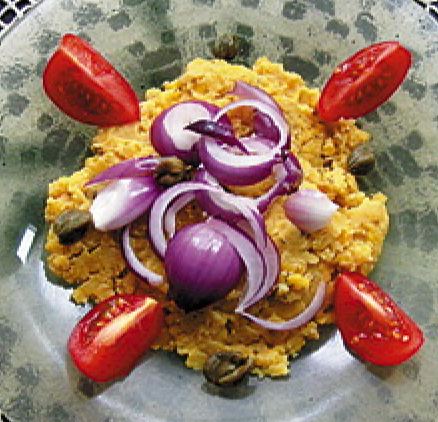 |
||
|
Common foods |
||
|
MARIANTHI MILONA* IF YOU think that Greek and Turkish cuisine are completely different from each other, you're wrong. Throughout the Ottoman occupation of Greece, the people found an easy way to communicate with one another - through recipes. However, nowadays, if you are sitting with friends in a taverna in the square of Platani village, located on the Dodecanese island of Kos, waiting for your doner kebab, questions such as what is Turkish and what is Greek are not foremost on your mind. Yet, there are extremely obvious reminders everywhere because Platani has the second largest Muslim community in Greece living peacefully alongside Orthodox Christians - and the cuisine, which is firmly in Muslim hands, sometimes looks pleasantly familiar. |
 |
|
|
Whether the kebabs turning on the spit are yiros or doner depends largely on the meat. Though both words mean "something that turns in a circle", clearly focusing on one aspect of their preparation, religion governs the main ingredient. Whereas Orthodox Christians with a clear conscience prefer pork, the Muslim inhabitants follow Allah's prohibition and opt for lamb or mutton instead.
It would not be a bad thing if international understanding came about as a result of cooking and borders started to disappear on plates. In Greek and Turkish cuisine, there is a whole range of such culinary blends, their presence being explained to a great extent by the centuries of Ottoman rule over Greece. Once the religious prescriptions have been taken care of, the marinade for both the yiros and doner kebab meat is the same. The mixture of salt, pepper, oregano, ground cumin and olive oil - which can be enhanced with chilli powder, pepper, rosemary, thyme and onions - gives the marinade its spiciness. Returning to the questions mentioned at the start of this article, we could perhaps conclude that, as far as broiling meat on a spit is concerned, neither cuisine has influenced the other, this shared aspect probably being as old as the use of fire itself. Broiling is a way of cooking meat not restricted to any particular area that requires no heavy, heat-resistant vessels and that was, therefore, used by hunters and soldiers in situations where every unnecessary expense had to be avoided. But if nowadays yiros and doner kebabs are undisputedly, albeit unjustifiably, considered to be the embodiment of Greek or Turkish food in Western Europe, the reason behind it may to some extent lie in the provisions the first foreign workers brought with them for their journey. Kali orexi! Tas kebab (Lamb or veal casserole) |
||
|
(Posting date 20 November 2008)
All articles of Athens News appearing on HCS have been reprinted with permission. |
||
|
||
|
2000 © Hellenic Communication Service, L.L.C. All Rights Reserved. http://www.HellenicComServe.com |
||

